International Laws, Guidance and Protocols: Transnational Crimes
VerifiedAdded on 2022/08/15
|12
|4562
|25
Essay
AI Summary
This essay critically examines the effectiveness of international laws, guidance, and protocols in combating transnational crimes. It argues the importance of international cooperation, analyzing the inadequacies of existing legal frameworks and protocols in addressing the evolving nature of transnational criminal activities. The essay explores the challenges posed by weak governance, corruption, and the increasing sophistication of criminal networks. It also delves into specific aspects of international cooperation, such as extradition, mutual assistance, and the forfeiture of criminal proceeds. The discussion includes an overview of the UN Convention on Transnational Organized Crime (UNTOC) and other relevant international agreements, highlighting their limitations and the need for stronger implementation and enforcement mechanisms. The essay also addresses the impact of transnational crimes on various sectors, including the economy, public health, and security, and emphasizes the importance of developing more robust and adaptable international responses to combat these crimes effectively. The analysis is supported by academic references, providing a comprehensive understanding of the subject.
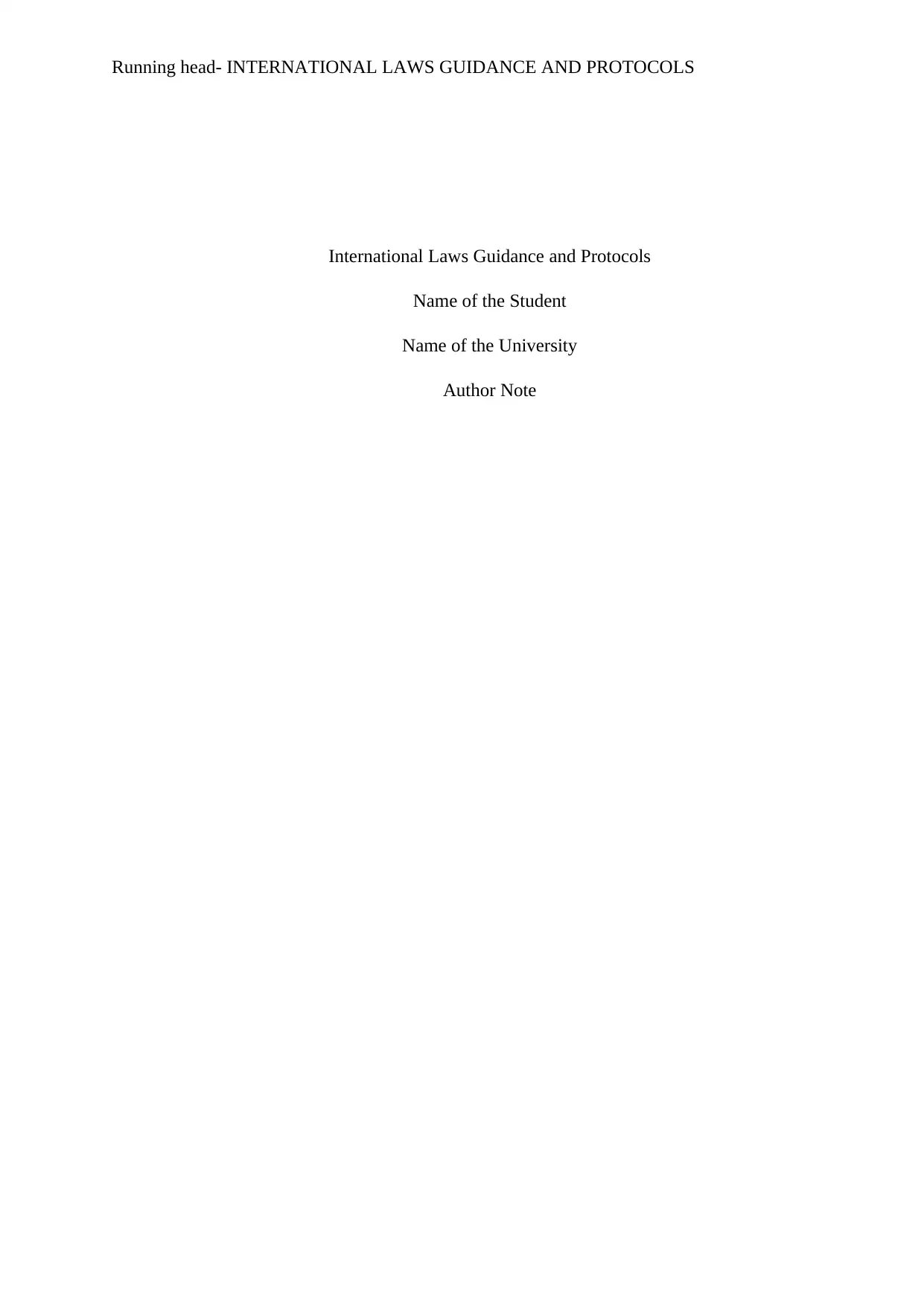
Running head- INTERNATIONAL LAWS GUIDANCE AND PROTOCOLS
International Laws Guidance and Protocols
Name of the Student
Name of the University
Author Note
International Laws Guidance and Protocols
Name of the Student
Name of the University
Author Note
Paraphrase This Document
Need a fresh take? Get an instant paraphrase of this document with our AI Paraphraser
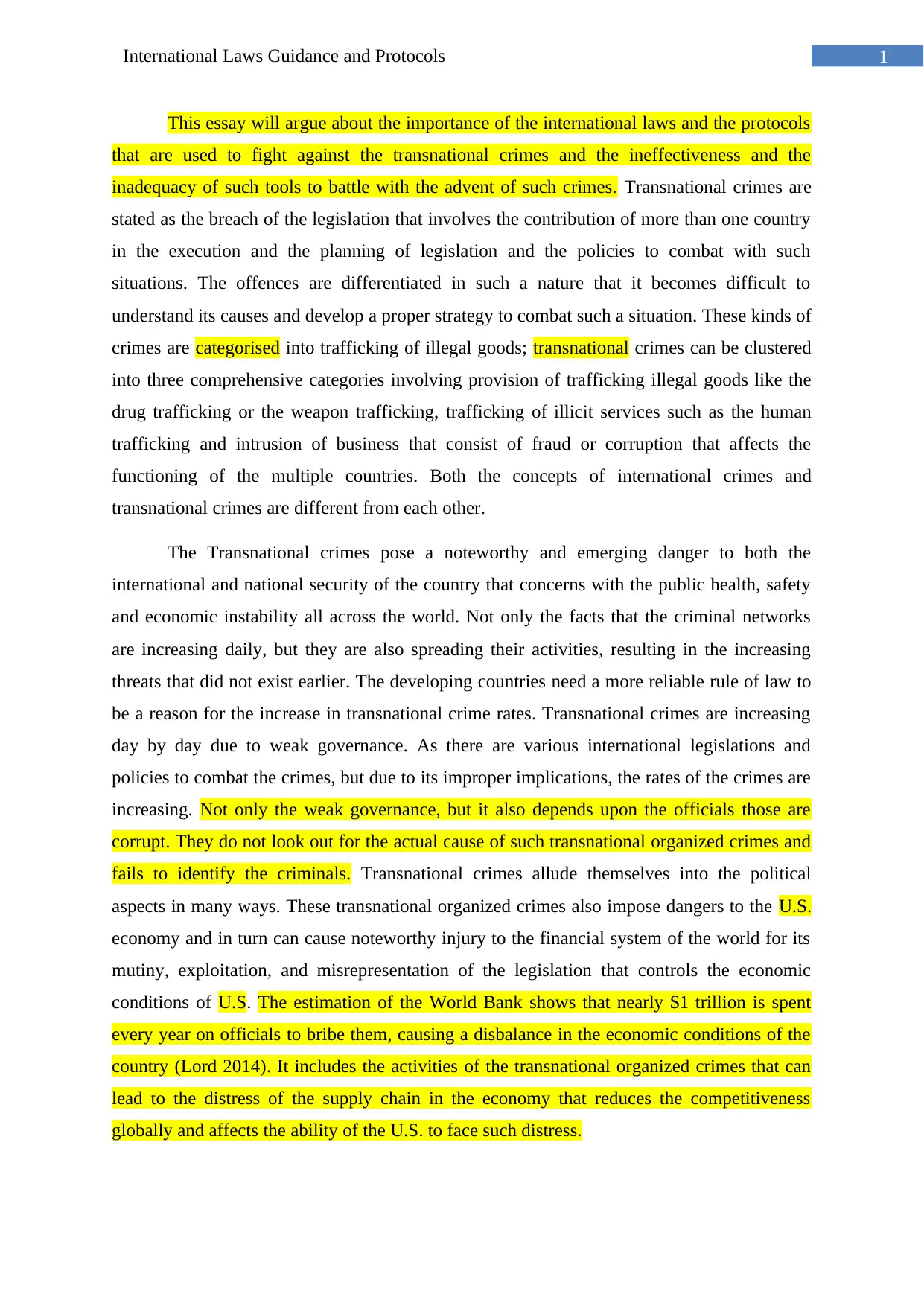
1International Laws Guidance and Protocols
This essay will argue about the importance of the international laws and the protocols
that are used to fight against the transnational crimes and the ineffectiveness and the
inadequacy of such tools to battle with the advent of such crimes. Transnational crimes are
stated as the breach of the legislation that involves the contribution of more than one country
in the execution and the planning of legislation and the policies to combat with such
situations. The offences are differentiated in such a nature that it becomes difficult to
understand its causes and develop a proper strategy to combat such a situation. These kinds of
crimes are categorised into trafficking of illegal goods; transnational crimes can be clustered
into three comprehensive categories involving provision of trafficking illegal goods like the
drug trafficking or the weapon trafficking, trafficking of illicit services such as the human
trafficking and intrusion of business that consist of fraud or corruption that affects the
functioning of the multiple countries. Both the concepts of international crimes and
transnational crimes are different from each other.
The Transnational crimes pose a noteworthy and emerging danger to both the
international and national security of the country that concerns with the public health, safety
and economic instability all across the world. Not only the facts that the criminal networks
are increasing daily, but they are also spreading their activities, resulting in the increasing
threats that did not exist earlier. The developing countries need a more reliable rule of law to
be a reason for the increase in transnational crime rates. Transnational crimes are increasing
day by day due to weak governance. As there are various international legislations and
policies to combat the crimes, but due to its improper implications, the rates of the crimes are
increasing. Not only the weak governance, but it also depends upon the officials those are
corrupt. They do not look out for the actual cause of such transnational organized crimes and
fails to identify the criminals. Transnational crimes allude themselves into the political
aspects in many ways. These transnational organized crimes also impose dangers to the U.S.
economy and in turn can cause noteworthy injury to the financial system of the world for its
mutiny, exploitation, and misrepresentation of the legislation that controls the economic
conditions of U.S. The estimation of the World Bank shows that nearly $1 trillion is spent
every year on officials to bribe them, causing a disbalance in the economic conditions of the
country (Lord 2014). It includes the activities of the transnational organized crimes that can
lead to the distress of the supply chain in the economy that reduces the competitiveness
globally and affects the ability of the U.S. to face such distress.
This essay will argue about the importance of the international laws and the protocols
that are used to fight against the transnational crimes and the ineffectiveness and the
inadequacy of such tools to battle with the advent of such crimes. Transnational crimes are
stated as the breach of the legislation that involves the contribution of more than one country
in the execution and the planning of legislation and the policies to combat with such
situations. The offences are differentiated in such a nature that it becomes difficult to
understand its causes and develop a proper strategy to combat such a situation. These kinds of
crimes are categorised into trafficking of illegal goods; transnational crimes can be clustered
into three comprehensive categories involving provision of trafficking illegal goods like the
drug trafficking or the weapon trafficking, trafficking of illicit services such as the human
trafficking and intrusion of business that consist of fraud or corruption that affects the
functioning of the multiple countries. Both the concepts of international crimes and
transnational crimes are different from each other.
The Transnational crimes pose a noteworthy and emerging danger to both the
international and national security of the country that concerns with the public health, safety
and economic instability all across the world. Not only the facts that the criminal networks
are increasing daily, but they are also spreading their activities, resulting in the increasing
threats that did not exist earlier. The developing countries need a more reliable rule of law to
be a reason for the increase in transnational crime rates. Transnational crimes are increasing
day by day due to weak governance. As there are various international legislations and
policies to combat the crimes, but due to its improper implications, the rates of the crimes are
increasing. Not only the weak governance, but it also depends upon the officials those are
corrupt. They do not look out for the actual cause of such transnational organized crimes and
fails to identify the criminals. Transnational crimes allude themselves into the political
aspects in many ways. These transnational organized crimes also impose dangers to the U.S.
economy and in turn can cause noteworthy injury to the financial system of the world for its
mutiny, exploitation, and misrepresentation of the legislation that controls the economic
conditions of U.S. The estimation of the World Bank shows that nearly $1 trillion is spent
every year on officials to bribe them, causing a disbalance in the economic conditions of the
country (Lord 2014). It includes the activities of the transnational organized crimes that can
lead to the distress of the supply chain in the economy that reduces the competitiveness
globally and affects the ability of the U.S. to face such distress.
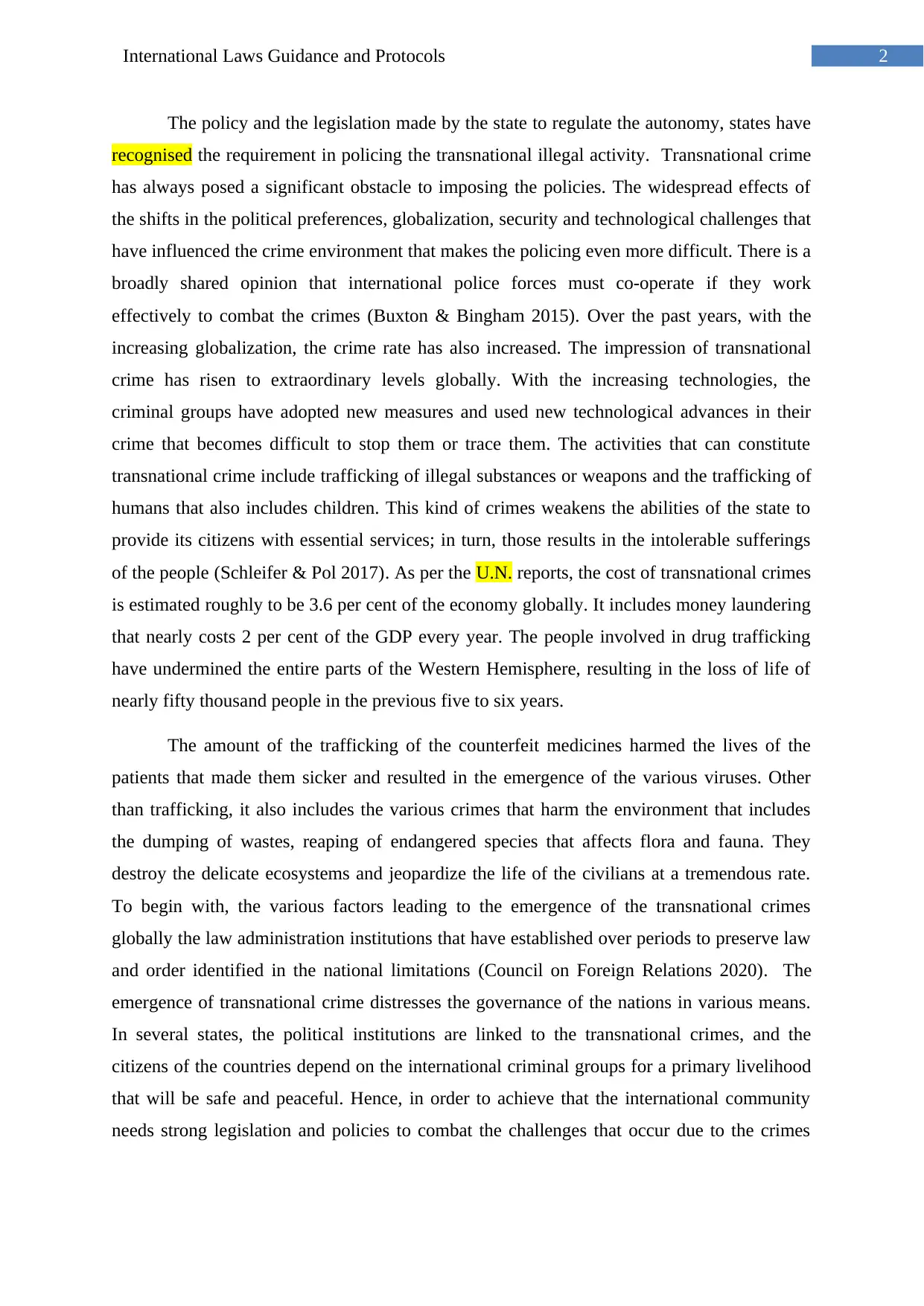
2International Laws Guidance and Protocols
The policy and the legislation made by the state to regulate the autonomy, states have
recognised the requirement in policing the transnational illegal activity. Transnational crime
has always posed a significant obstacle to imposing the policies. The widespread effects of
the shifts in the political preferences, globalization, security and technological challenges that
have influenced the crime environment that makes the policing even more difficult. There is a
broadly shared opinion that international police forces must co-operate if they work
effectively to combat the crimes (Buxton & Bingham 2015). Over the past years, with the
increasing globalization, the crime rate has also increased. The impression of transnational
crime has risen to extraordinary levels globally. With the increasing technologies, the
criminal groups have adopted new measures and used new technological advances in their
crime that becomes difficult to stop them or trace them. The activities that can constitute
transnational crime include trafficking of illegal substances or weapons and the trafficking of
humans that also includes children. This kind of crimes weakens the abilities of the state to
provide its citizens with essential services; in turn, those results in the intolerable sufferings
of the people (Schleifer & Pol 2017). As per the U.N. reports, the cost of transnational crimes
is estimated roughly to be 3.6 per cent of the economy globally. It includes money laundering
that nearly costs 2 per cent of the GDP every year. The people involved in drug trafficking
have undermined the entire parts of the Western Hemisphere, resulting in the loss of life of
nearly fifty thousand people in the previous five to six years.
The amount of the trafficking of the counterfeit medicines harmed the lives of the
patients that made them sicker and resulted in the emergence of the various viruses. Other
than trafficking, it also includes the various crimes that harm the environment that includes
the dumping of wastes, reaping of endangered species that affects flora and fauna. They
destroy the delicate ecosystems and jeopardize the life of the civilians at a tremendous rate.
To begin with, the various factors leading to the emergence of the transnational crimes
globally the law administration institutions that have established over periods to preserve law
and order identified in the national limitations (Council on Foreign Relations 2020). The
emergence of transnational crime distresses the governance of the nations in various means.
In several states, the political institutions are linked to the transnational crimes, and the
citizens of the countries depend on the international criminal groups for a primary livelihood
that will be safe and peaceful. Hence, in order to achieve that the international community
needs strong legislation and policies to combat the challenges that occur due to the crimes
The policy and the legislation made by the state to regulate the autonomy, states have
recognised the requirement in policing the transnational illegal activity. Transnational crime
has always posed a significant obstacle to imposing the policies. The widespread effects of
the shifts in the political preferences, globalization, security and technological challenges that
have influenced the crime environment that makes the policing even more difficult. There is a
broadly shared opinion that international police forces must co-operate if they work
effectively to combat the crimes (Buxton & Bingham 2015). Over the past years, with the
increasing globalization, the crime rate has also increased. The impression of transnational
crime has risen to extraordinary levels globally. With the increasing technologies, the
criminal groups have adopted new measures and used new technological advances in their
crime that becomes difficult to stop them or trace them. The activities that can constitute
transnational crime include trafficking of illegal substances or weapons and the trafficking of
humans that also includes children. This kind of crimes weakens the abilities of the state to
provide its citizens with essential services; in turn, those results in the intolerable sufferings
of the people (Schleifer & Pol 2017). As per the U.N. reports, the cost of transnational crimes
is estimated roughly to be 3.6 per cent of the economy globally. It includes money laundering
that nearly costs 2 per cent of the GDP every year. The people involved in drug trafficking
have undermined the entire parts of the Western Hemisphere, resulting in the loss of life of
nearly fifty thousand people in the previous five to six years.
The amount of the trafficking of the counterfeit medicines harmed the lives of the
patients that made them sicker and resulted in the emergence of the various viruses. Other
than trafficking, it also includes the various crimes that harm the environment that includes
the dumping of wastes, reaping of endangered species that affects flora and fauna. They
destroy the delicate ecosystems and jeopardize the life of the civilians at a tremendous rate.
To begin with, the various factors leading to the emergence of the transnational crimes
globally the law administration institutions that have established over periods to preserve law
and order identified in the national limitations (Council on Foreign Relations 2020). The
emergence of transnational crime distresses the governance of the nations in various means.
In several states, the political institutions are linked to the transnational crimes, and the
citizens of the countries depend on the international criminal groups for a primary livelihood
that will be safe and peaceful. Hence, in order to achieve that the international community
needs strong legislation and policies to combat the challenges that occur due to the crimes
⊘ This is a preview!⊘
Do you want full access?
Subscribe today to unlock all pages.

Trusted by 1+ million students worldwide
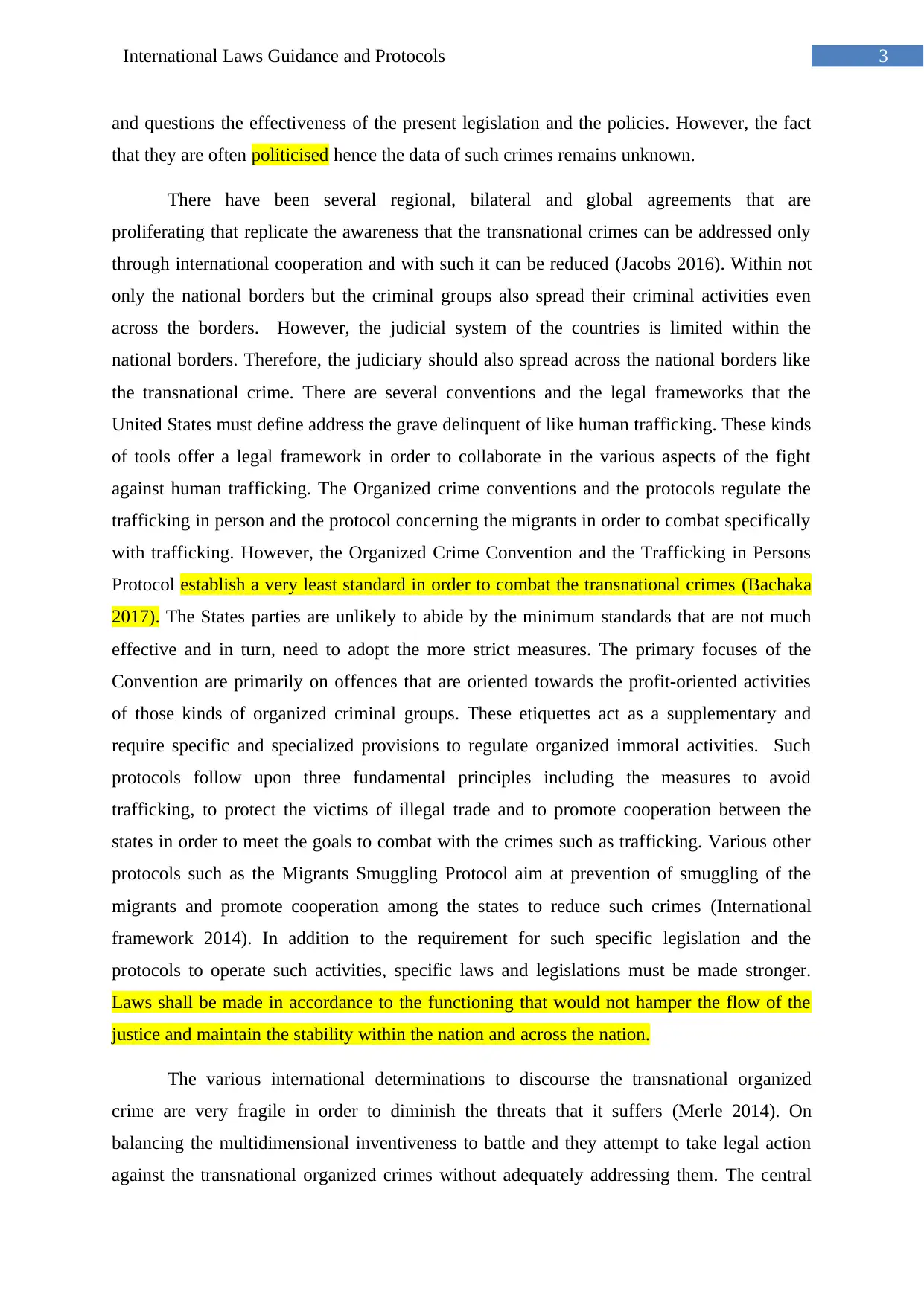
3International Laws Guidance and Protocols
and questions the effectiveness of the present legislation and the policies. However, the fact
that they are often politicised hence the data of such crimes remains unknown.
There have been several regional, bilateral and global agreements that are
proliferating that replicate the awareness that the transnational crimes can be addressed only
through international cooperation and with such it can be reduced (Jacobs 2016). Within not
only the national borders but the criminal groups also spread their criminal activities even
across the borders. However, the judicial system of the countries is limited within the
national borders. Therefore, the judiciary should also spread across the national borders like
the transnational crime. There are several conventions and the legal frameworks that the
United States must define address the grave delinquent of like human trafficking. These kinds
of tools offer a legal framework in order to collaborate in the various aspects of the fight
against human trafficking. The Organized crime conventions and the protocols regulate the
trafficking in person and the protocol concerning the migrants in order to combat specifically
with trafficking. However, the Organized Crime Convention and the Trafficking in Persons
Protocol establish a very least standard in order to combat the transnational crimes (Bachaka
2017). The States parties are unlikely to abide by the minimum standards that are not much
effective and in turn, need to adopt the more strict measures. The primary focuses of the
Convention are primarily on offences that are oriented towards the profit-oriented activities
of those kinds of organized criminal groups. These etiquettes act as a supplementary and
require specific and specialized provisions to regulate organized immoral activities. Such
protocols follow upon three fundamental principles including the measures to avoid
trafficking, to protect the victims of illegal trade and to promote cooperation between the
states in order to meet the goals to combat with the crimes such as trafficking. Various other
protocols such as the Migrants Smuggling Protocol aim at prevention of smuggling of the
migrants and promote cooperation among the states to reduce such crimes (International
framework 2014). In addition to the requirement for such specific legislation and the
protocols to operate such activities, specific laws and legislations must be made stronger.
Laws shall be made in accordance to the functioning that would not hamper the flow of the
justice and maintain the stability within the nation and across the nation.
The various international determinations to discourse the transnational organized
crime are very fragile in order to diminish the threats that it suffers (Merle 2014). On
balancing the multidimensional inventiveness to battle and they attempt to take legal action
against the transnational organized crimes without adequately addressing them. The central
and questions the effectiveness of the present legislation and the policies. However, the fact
that they are often politicised hence the data of such crimes remains unknown.
There have been several regional, bilateral and global agreements that are
proliferating that replicate the awareness that the transnational crimes can be addressed only
through international cooperation and with such it can be reduced (Jacobs 2016). Within not
only the national borders but the criminal groups also spread their criminal activities even
across the borders. However, the judicial system of the countries is limited within the
national borders. Therefore, the judiciary should also spread across the national borders like
the transnational crime. There are several conventions and the legal frameworks that the
United States must define address the grave delinquent of like human trafficking. These kinds
of tools offer a legal framework in order to collaborate in the various aspects of the fight
against human trafficking. The Organized crime conventions and the protocols regulate the
trafficking in person and the protocol concerning the migrants in order to combat specifically
with trafficking. However, the Organized Crime Convention and the Trafficking in Persons
Protocol establish a very least standard in order to combat the transnational crimes (Bachaka
2017). The States parties are unlikely to abide by the minimum standards that are not much
effective and in turn, need to adopt the more strict measures. The primary focuses of the
Convention are primarily on offences that are oriented towards the profit-oriented activities
of those kinds of organized criminal groups. These etiquettes act as a supplementary and
require specific and specialized provisions to regulate organized immoral activities. Such
protocols follow upon three fundamental principles including the measures to avoid
trafficking, to protect the victims of illegal trade and to promote cooperation between the
states in order to meet the goals to combat with the crimes such as trafficking. Various other
protocols such as the Migrants Smuggling Protocol aim at prevention of smuggling of the
migrants and promote cooperation among the states to reduce such crimes (International
framework 2014). In addition to the requirement for such specific legislation and the
protocols to operate such activities, specific laws and legislations must be made stronger.
Laws shall be made in accordance to the functioning that would not hamper the flow of the
justice and maintain the stability within the nation and across the nation.
The various international determinations to discourse the transnational organized
crime are very fragile in order to diminish the threats that it suffers (Merle 2014). On
balancing the multidimensional inventiveness to battle and they attempt to take legal action
against the transnational organized crimes without adequately addressing them. The central
Paraphrase This Document
Need a fresh take? Get an instant paraphrase of this document with our AI Paraphraser
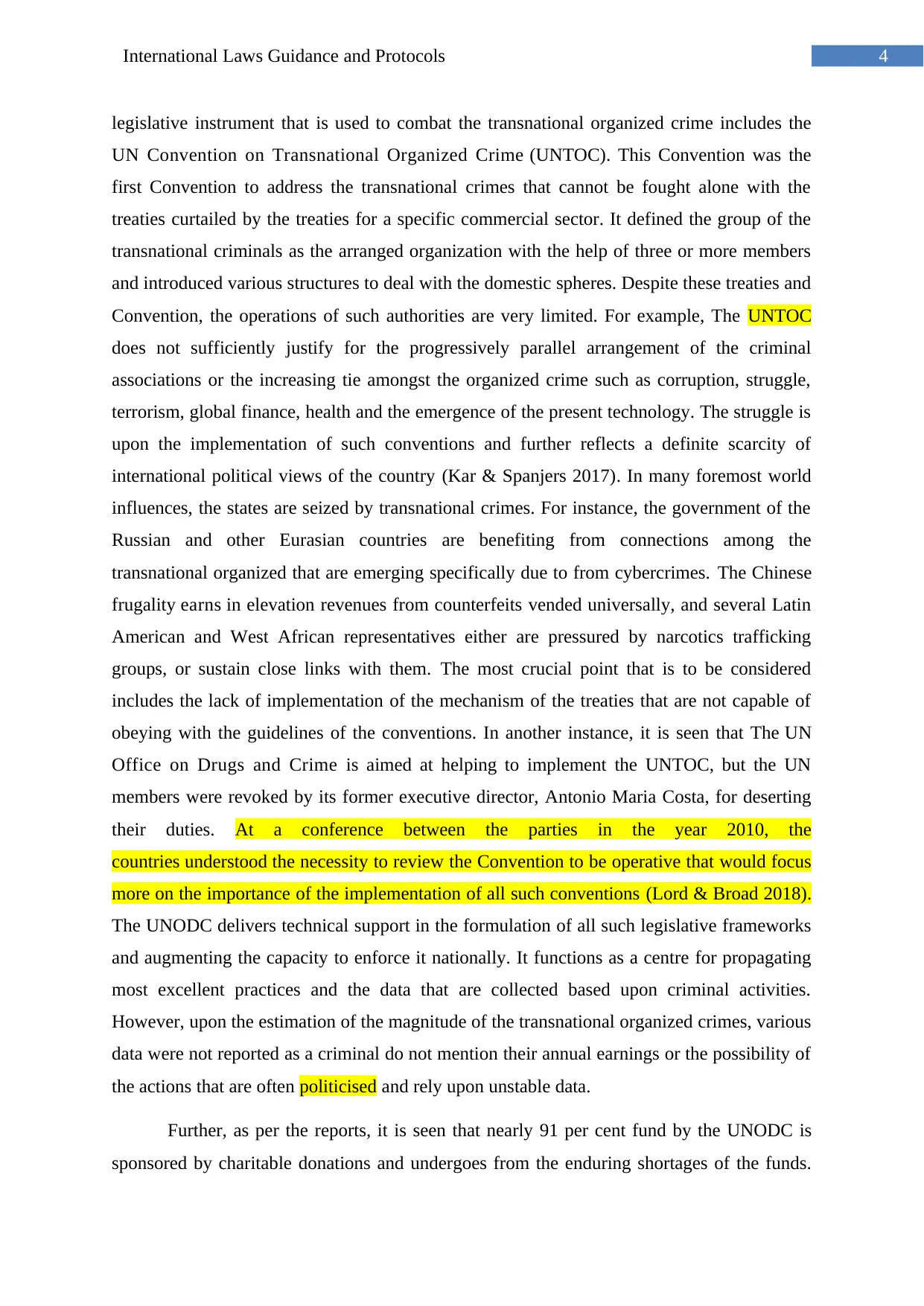
4International Laws Guidance and Protocols
legislative instrument that is used to combat the transnational organized crime includes the
UN Convention on Transnational Organized Crime (UNTOC). This Convention was the
first Convention to address the transnational crimes that cannot be fought alone with the
treaties curtailed by the treaties for a specific commercial sector. It defined the group of the
transnational criminals as the arranged organization with the help of three or more members
and introduced various structures to deal with the domestic spheres. Despite these treaties and
Convention, the operations of such authorities are very limited. For example, The UNTOC
does not sufficiently justify for the progressively parallel arrangement of the criminal
associations or the increasing tie amongst the organized crime such as corruption, struggle,
terrorism, global finance, health and the emergence of the present technology. The struggle is
upon the implementation of such conventions and further reflects a definite scarcity of
international political views of the country (Kar & Spanjers 2017). In many foremost world
influences, the states are seized by transnational crimes. For instance, the government of the
Russian and other Eurasian countries are benefiting from connections among the
transnational organized that are emerging specifically due to from cybercrimes. “The Chinese
frugality earns in elevation revenues from counterfeits vended universally, and several Latin
American and West African representatives either are pressured by narcotics trafficking
groups, or sustain close links with them.” The most crucial point that is to be considered
includes the lack of implementation of the mechanism of the treaties that are not capable of
obeying with the guidelines of the conventions. In another instance, it is seen that The UN
Office on Drugs and Crime is aimed at helping to implement the UNTOC, but the UN
members were revoked by its former executive director, Antonio Maria Costa, for deserting
their duties. At a conference between the parties in the year 2010, the
countries understood the necessity to review the Convention to be operative that would focus
more on the importance of the implementation of all such conventions (Lord & Broad 2018).
The UNODC delivers technical support in the formulation of all such legislative frameworks
and augmenting the capacity to enforce it nationally. It functions as a centre for propagating
most excellent practices and the data that are collected based upon criminal activities.
However, upon the estimation of the magnitude of the transnational organized crimes, various
data were not reported as a criminal do not mention their annual earnings or the possibility of
the actions that are often politicised and rely upon unstable data.
Further, as per the reports, it is seen that nearly 91 per cent fund by the UNODC is
sponsored by charitable donations and undergoes from the enduring shortages of the funds.
legislative instrument that is used to combat the transnational organized crime includes the
UN Convention on Transnational Organized Crime (UNTOC). This Convention was the
first Convention to address the transnational crimes that cannot be fought alone with the
treaties curtailed by the treaties for a specific commercial sector. It defined the group of the
transnational criminals as the arranged organization with the help of three or more members
and introduced various structures to deal with the domestic spheres. Despite these treaties and
Convention, the operations of such authorities are very limited. For example, The UNTOC
does not sufficiently justify for the progressively parallel arrangement of the criminal
associations or the increasing tie amongst the organized crime such as corruption, struggle,
terrorism, global finance, health and the emergence of the present technology. The struggle is
upon the implementation of such conventions and further reflects a definite scarcity of
international political views of the country (Kar & Spanjers 2017). In many foremost world
influences, the states are seized by transnational crimes. For instance, the government of the
Russian and other Eurasian countries are benefiting from connections among the
transnational organized that are emerging specifically due to from cybercrimes. “The Chinese
frugality earns in elevation revenues from counterfeits vended universally, and several Latin
American and West African representatives either are pressured by narcotics trafficking
groups, or sustain close links with them.” The most crucial point that is to be considered
includes the lack of implementation of the mechanism of the treaties that are not capable of
obeying with the guidelines of the conventions. In another instance, it is seen that The UN
Office on Drugs and Crime is aimed at helping to implement the UNTOC, but the UN
members were revoked by its former executive director, Antonio Maria Costa, for deserting
their duties. At a conference between the parties in the year 2010, the
countries understood the necessity to review the Convention to be operative that would focus
more on the importance of the implementation of all such conventions (Lord & Broad 2018).
The UNODC delivers technical support in the formulation of all such legislative frameworks
and augmenting the capacity to enforce it nationally. It functions as a centre for propagating
most excellent practices and the data that are collected based upon criminal activities.
However, upon the estimation of the magnitude of the transnational organized crimes, various
data were not reported as a criminal do not mention their annual earnings or the possibility of
the actions that are often politicised and rely upon unstable data.
Further, as per the reports, it is seen that nearly 91 per cent fund by the UNODC is
sponsored by charitable donations and undergoes from the enduring shortages of the funds.
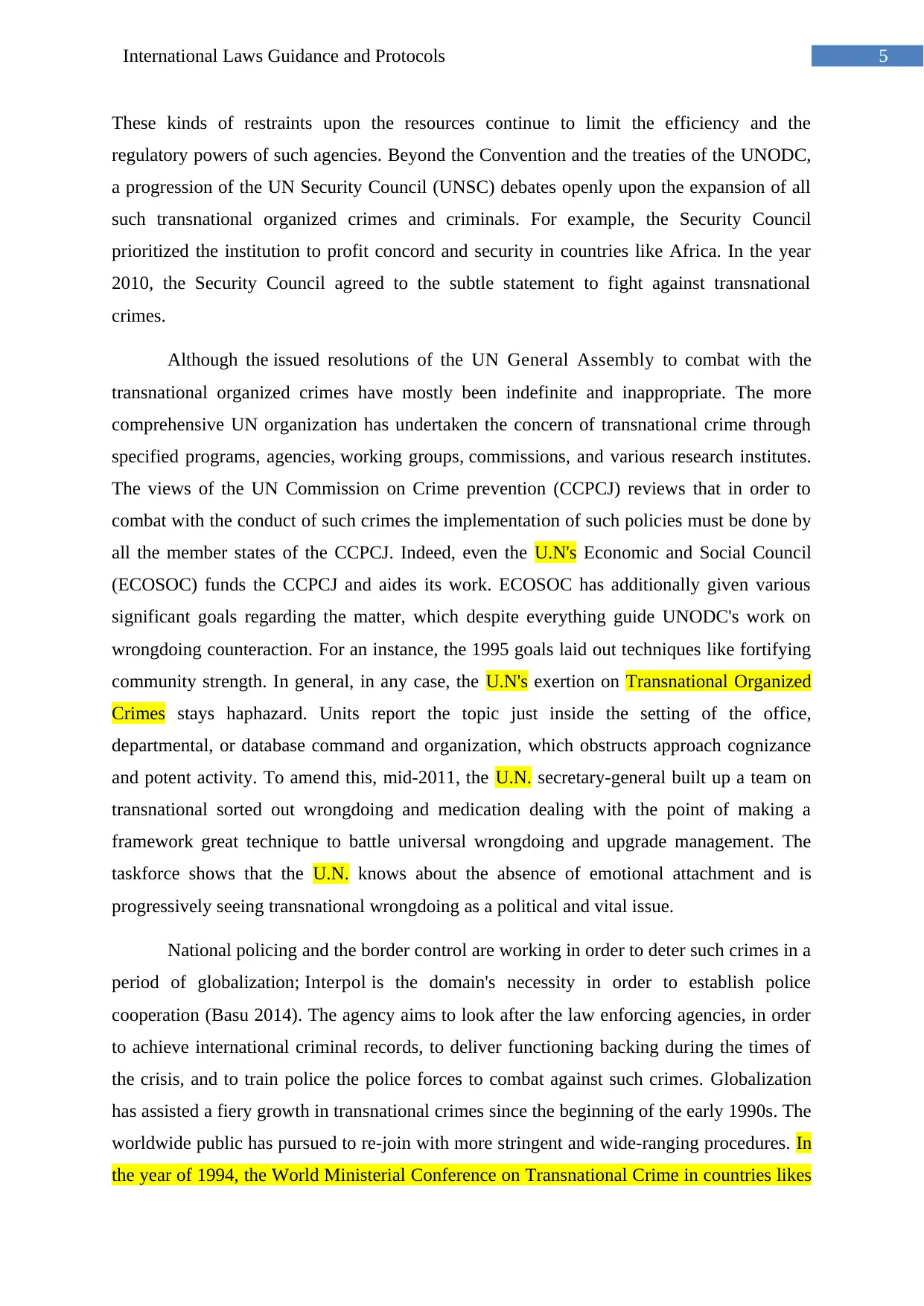
5International Laws Guidance and Protocols
These kinds of restraints upon the resources continue to limit the efficiency and the
regulatory powers of such agencies. Beyond the Convention and the treaties of the UNODC,
a progression of the UN Security Council (UNSC) debates openly upon the expansion of all
such transnational organized crimes and criminals. For example, the Security Council
prioritized the institution to profit concord and security in countries like Africa. In the year
2010, the Security Council agreed to the subtle statement to fight against transnational
crimes.
Although the issued resolutions of the UN General Assembly to combat with the
transnational organized crimes have mostly been indefinite and inappropriate. The more
comprehensive UN organization has undertaken the concern of transnational crime through
specified programs, agencies, working groups, commissions, and various research institutes.
The views of the UN Commission on Crime prevention (CCPCJ) reviews that in order to
combat with the conduct of such crimes the implementation of such policies must be done by
all the member states of the CCPCJ. Indeed, even the U.N's Economic and Social Council
(ECOSOC) funds the CCPCJ and aides its work. ECOSOC has additionally given various
significant goals regarding the matter, which despite everything guide UNODC's work on
wrongdoing counteraction. For an instance, the 1995 goals laid out techniques like fortifying
community strength. In general, in any case, the U.N's exertion on Transnational Organized
Crimes stays haphazard. Units report the topic just inside the setting of the office,
departmental, or database command and organization, which obstructs approach cognizance
and potent activity. To amend this, mid-2011, the U.N. secretary-general built up a team on
transnational sorted out wrongdoing and medication dealing with the point of making a
framework great technique to battle universal wrongdoing and upgrade management. The
taskforce shows that the U.N. knows about the absence of emotional attachment and is
progressively seeing transnational wrongdoing as a political and vital issue.
National policing and the border control are working in order to deter such crimes in a
period of globalization; Interpol is the domain's necessity in order to establish police
cooperation (Basu 2014). The agency aims to look after the law enforcing agencies, in order
to achieve international criminal records, to deliver functioning backing during the times of
the crisis, and to train police the police forces to combat against such crimes. Globalization
has assisted a fiery growth in transnational crimes since the beginning of the early 1990s. The
worldwide public has pursued to re-join with more stringent and wide-ranging procedures. In
the year of 1994, the World Ministerial Conference on Transnational Crime in countries likes
These kinds of restraints upon the resources continue to limit the efficiency and the
regulatory powers of such agencies. Beyond the Convention and the treaties of the UNODC,
a progression of the UN Security Council (UNSC) debates openly upon the expansion of all
such transnational organized crimes and criminals. For example, the Security Council
prioritized the institution to profit concord and security in countries like Africa. In the year
2010, the Security Council agreed to the subtle statement to fight against transnational
crimes.
Although the issued resolutions of the UN General Assembly to combat with the
transnational organized crimes have mostly been indefinite and inappropriate. The more
comprehensive UN organization has undertaken the concern of transnational crime through
specified programs, agencies, working groups, commissions, and various research institutes.
The views of the UN Commission on Crime prevention (CCPCJ) reviews that in order to
combat with the conduct of such crimes the implementation of such policies must be done by
all the member states of the CCPCJ. Indeed, even the U.N's Economic and Social Council
(ECOSOC) funds the CCPCJ and aides its work. ECOSOC has additionally given various
significant goals regarding the matter, which despite everything guide UNODC's work on
wrongdoing counteraction. For an instance, the 1995 goals laid out techniques like fortifying
community strength. In general, in any case, the U.N's exertion on Transnational Organized
Crimes stays haphazard. Units report the topic just inside the setting of the office,
departmental, or database command and organization, which obstructs approach cognizance
and potent activity. To amend this, mid-2011, the U.N. secretary-general built up a team on
transnational sorted out wrongdoing and medication dealing with the point of making a
framework great technique to battle universal wrongdoing and upgrade management. The
taskforce shows that the U.N. knows about the absence of emotional attachment and is
progressively seeing transnational wrongdoing as a political and vital issue.
National policing and the border control are working in order to deter such crimes in a
period of globalization; Interpol is the domain's necessity in order to establish police
cooperation (Basu 2014). The agency aims to look after the law enforcing agencies, in order
to achieve international criminal records, to deliver functioning backing during the times of
the crisis, and to train police the police forces to combat against such crimes. Globalization
has assisted a fiery growth in transnational crimes since the beginning of the early 1990s. The
worldwide public has pursued to re-join with more stringent and wide-ranging procedures. In
the year of 1994, the World Ministerial Conference on Transnational Crime in countries likes
⊘ This is a preview!⊘
Do you want full access?
Subscribe today to unlock all pages.

Trusted by 1+ million students worldwide
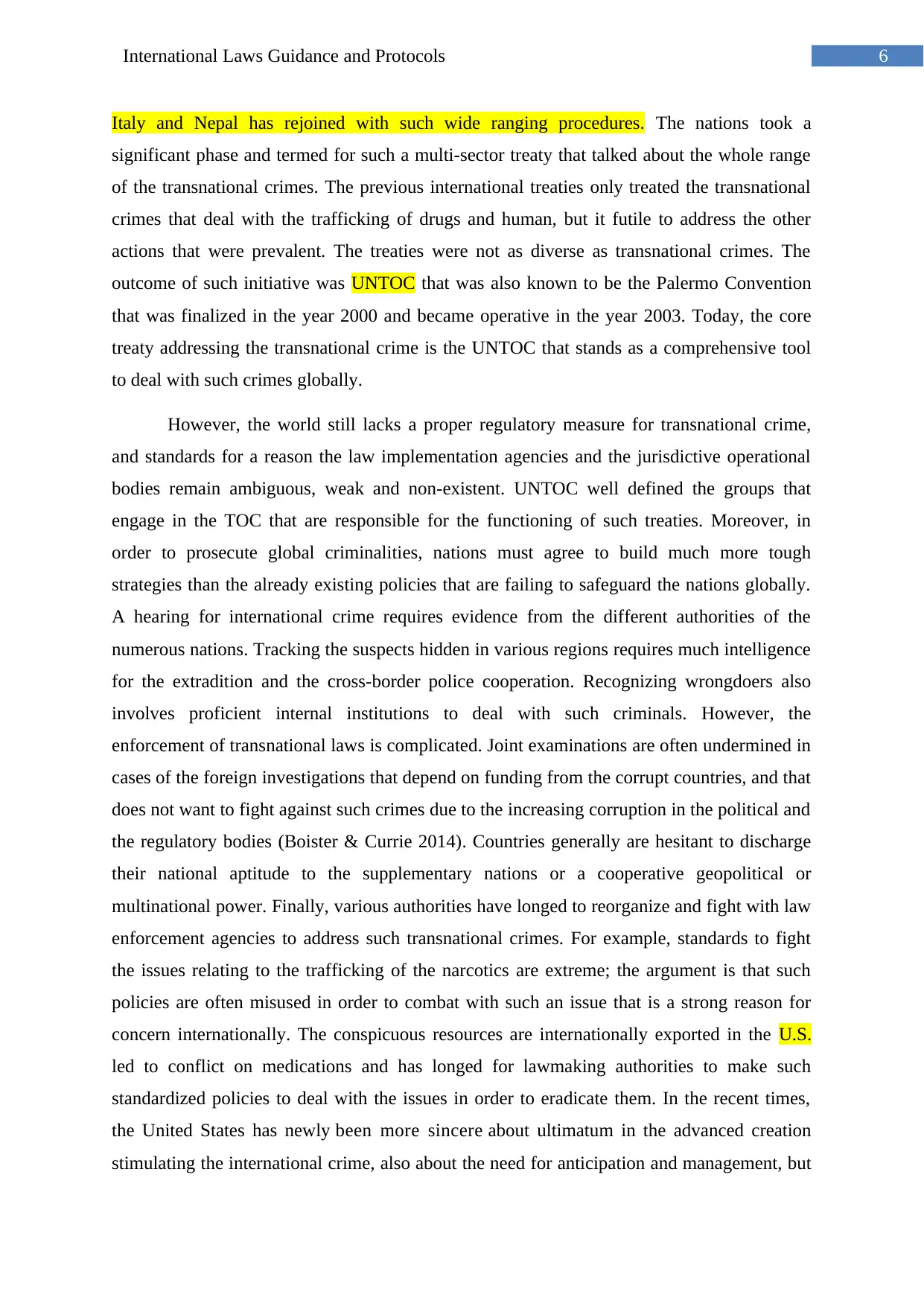
6International Laws Guidance and Protocols
Italy and Nepal has rejoined with such wide ranging procedures. The nations took a
significant phase and termed for such a multi-sector treaty that talked about the whole range
of the transnational crimes. The previous international treaties only treated the transnational
crimes that deal with the trafficking of drugs and human, but it futile to address the other
actions that were prevalent. The treaties were not as diverse as transnational crimes. The
outcome of such initiative was UNTOC that was also known to be the Palermo Convention
that was finalized in the year 2000 and became operative in the year 2003. Today, the core
treaty addressing the transnational crime is the UNTOC that stands as a comprehensive tool
to deal with such crimes globally.
However, the world still lacks a proper regulatory measure for transnational crime,
and standards for a reason the law implementation agencies and the jurisdictive operational
bodies remain ambiguous, weak and non-existent. UNTOC well defined the groups that
engage in the TOC that are responsible for the functioning of such treaties. Moreover, in
order to prosecute global criminalities, nations must agree to build much more tough
strategies than the already existing policies that are failing to safeguard the nations globally.
A hearing for international crime requires evidence from the different authorities of the
numerous nations. Tracking the suspects hidden in various regions requires much intelligence
for the extradition and the cross-border police cooperation. Recognizing wrongdoers also
involves proficient internal institutions to deal with such criminals. However, the
enforcement of transnational laws is complicated. Joint examinations are often undermined in
cases of the foreign investigations that depend on funding from the corrupt countries, and that
does not want to fight against such crimes due to the increasing corruption in the political and
the regulatory bodies (Boister & Currie 2014). Countries generally are hesitant to discharge
their national aptitude to the supplementary nations or a cooperative geopolitical or
multinational power. Finally, various authorities have longed to reorganize and fight with law
enforcement agencies to address such transnational crimes. For example, standards to fight
the issues relating to the trafficking of the narcotics are extreme; the argument is that such
policies are often misused in order to combat with such an issue that is a strong reason for
concern internationally. The conspicuous resources are internationally exported in the U.S.
led to conflict on medications and has longed for lawmaking authorities to make such
standardized policies to deal with the issues in order to eradicate them. In the recent times,
the United States has newly been more sincere about ultimatum in the advanced creation
stimulating the international crime, also about the need for anticipation and management, but
Italy and Nepal has rejoined with such wide ranging procedures. The nations took a
significant phase and termed for such a multi-sector treaty that talked about the whole range
of the transnational crimes. The previous international treaties only treated the transnational
crimes that deal with the trafficking of drugs and human, but it futile to address the other
actions that were prevalent. The treaties were not as diverse as transnational crimes. The
outcome of such initiative was UNTOC that was also known to be the Palermo Convention
that was finalized in the year 2000 and became operative in the year 2003. Today, the core
treaty addressing the transnational crime is the UNTOC that stands as a comprehensive tool
to deal with such crimes globally.
However, the world still lacks a proper regulatory measure for transnational crime,
and standards for a reason the law implementation agencies and the jurisdictive operational
bodies remain ambiguous, weak and non-existent. UNTOC well defined the groups that
engage in the TOC that are responsible for the functioning of such treaties. Moreover, in
order to prosecute global criminalities, nations must agree to build much more tough
strategies than the already existing policies that are failing to safeguard the nations globally.
A hearing for international crime requires evidence from the different authorities of the
numerous nations. Tracking the suspects hidden in various regions requires much intelligence
for the extradition and the cross-border police cooperation. Recognizing wrongdoers also
involves proficient internal institutions to deal with such criminals. However, the
enforcement of transnational laws is complicated. Joint examinations are often undermined in
cases of the foreign investigations that depend on funding from the corrupt countries, and that
does not want to fight against such crimes due to the increasing corruption in the political and
the regulatory bodies (Boister & Currie 2014). Countries generally are hesitant to discharge
their national aptitude to the supplementary nations or a cooperative geopolitical or
multinational power. Finally, various authorities have longed to reorganize and fight with law
enforcement agencies to address such transnational crimes. For example, standards to fight
the issues relating to the trafficking of the narcotics are extreme; the argument is that such
policies are often misused in order to combat with such an issue that is a strong reason for
concern internationally. The conspicuous resources are internationally exported in the U.S.
led to conflict on medications and has longed for lawmaking authorities to make such
standardized policies to deal with the issues in order to eradicate them. In the recent times,
the United States has newly been more sincere about ultimatum in the advanced creation
stimulating the international crime, also about the need for anticipation and management, but
Paraphrase This Document
Need a fresh take? Get an instant paraphrase of this document with our AI Paraphraser
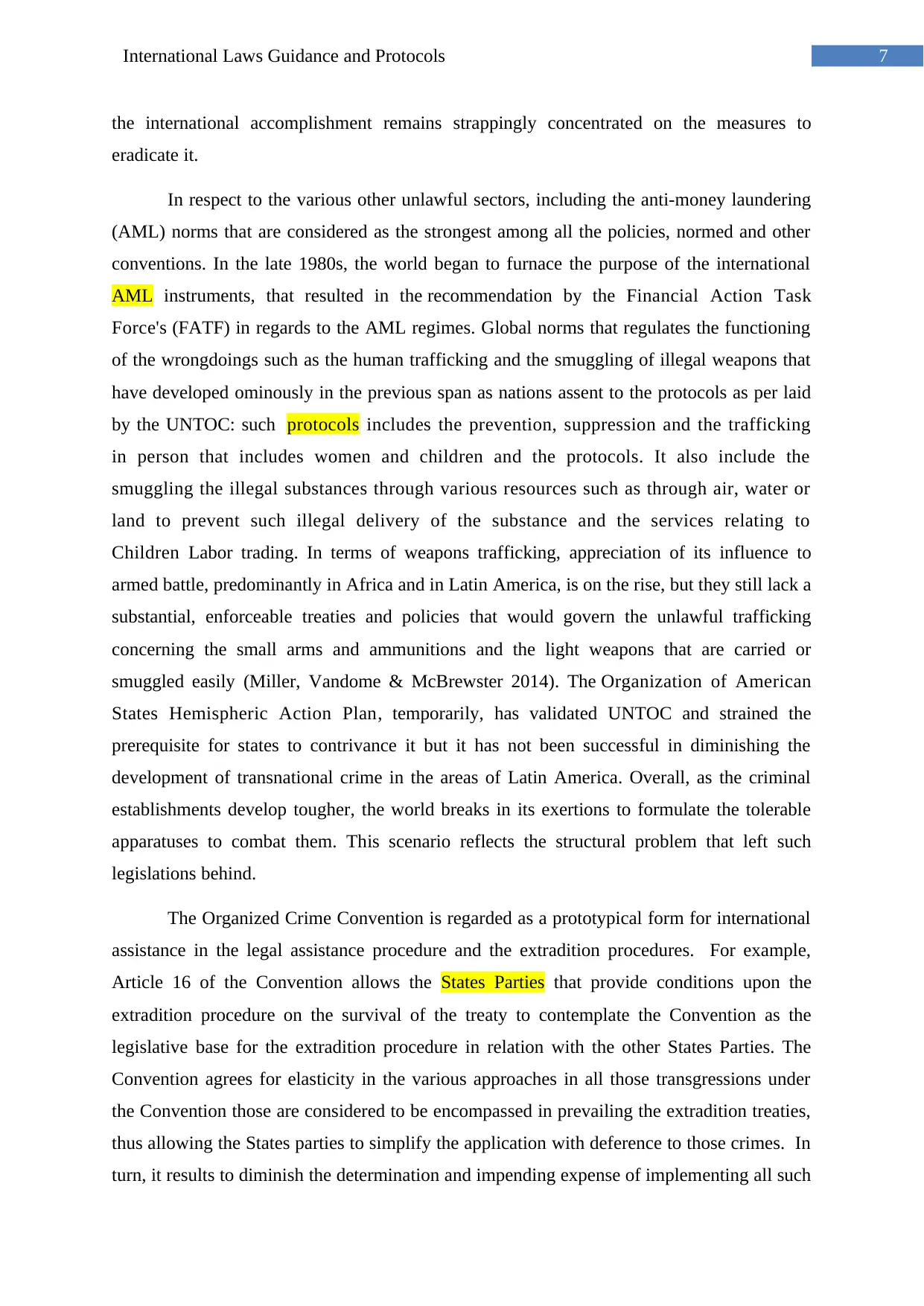
7International Laws Guidance and Protocols
the international accomplishment remains strappingly concentrated on the measures to
eradicate it.
In respect to the various other unlawful sectors, including the anti-money laundering
(AML) norms that are considered as the strongest among all the policies, normed and other
conventions. In the late 1980s, the world began to furnace the purpose of the international
AML instruments, that resulted in the recommendation by the Financial Action Task
Force's (FATF) in regards to the AML regimes. Global norms that regulates the functioning
of the wrongdoings such as the human trafficking and the smuggling of illegal weapons that
have developed ominously in the previous span as nations assent to the protocols as per laid
by the UNTOC: such protocols includes the prevention, suppression and the trafficking
in person that includes women and children and the protocols. It also include the
smuggling the illegal substances through various resources such as through air, water or
land to prevent such illegal delivery of the substance and the services relating to
Children Labor trading. In terms of weapons trafficking, appreciation of its influence to
armed battle, predominantly in Africa and in Latin America, is on the rise, but they still lack a
substantial, enforceable treaties and policies that would govern the unlawful trafficking
concerning the small arms and ammunitions and the light weapons that are carried or
smuggled easily (Miller, Vandome & McBrewster 2014). The Organization of American
States Hemispheric Action Plan, temporarily, has validated UNTOC and strained the
prerequisite for states to contrivance it but it has not been successful in diminishing the
development of transnational crime in the areas of Latin America. Overall, as the criminal
establishments develop tougher, the world breaks in its exertions to formulate the tolerable
apparatuses to combat them. This scenario reflects the structural problem that left such
legislations behind.
The Organized Crime Convention is regarded as a prototypical form for international
assistance in the legal assistance procedure and the extradition procedures. For example,
Article 16 of the Convention allows the States Parties that provide conditions upon the
extradition procedure on the survival of the treaty to contemplate the Convention as the
legislative base for the extradition procedure in relation with the other States Parties. The
Convention agrees for elasticity in the various approaches in all those transgressions under
the Convention those are considered to be encompassed in prevailing the extradition treaties,
thus allowing the States parties to simplify the application with deference to those crimes. In
turn, it results to diminish the determination and impending expense of implementing all such
the international accomplishment remains strappingly concentrated on the measures to
eradicate it.
In respect to the various other unlawful sectors, including the anti-money laundering
(AML) norms that are considered as the strongest among all the policies, normed and other
conventions. In the late 1980s, the world began to furnace the purpose of the international
AML instruments, that resulted in the recommendation by the Financial Action Task
Force's (FATF) in regards to the AML regimes. Global norms that regulates the functioning
of the wrongdoings such as the human trafficking and the smuggling of illegal weapons that
have developed ominously in the previous span as nations assent to the protocols as per laid
by the UNTOC: such protocols includes the prevention, suppression and the trafficking
in person that includes women and children and the protocols. It also include the
smuggling the illegal substances through various resources such as through air, water or
land to prevent such illegal delivery of the substance and the services relating to
Children Labor trading. In terms of weapons trafficking, appreciation of its influence to
armed battle, predominantly in Africa and in Latin America, is on the rise, but they still lack a
substantial, enforceable treaties and policies that would govern the unlawful trafficking
concerning the small arms and ammunitions and the light weapons that are carried or
smuggled easily (Miller, Vandome & McBrewster 2014). The Organization of American
States Hemispheric Action Plan, temporarily, has validated UNTOC and strained the
prerequisite for states to contrivance it but it has not been successful in diminishing the
development of transnational crime in the areas of Latin America. Overall, as the criminal
establishments develop tougher, the world breaks in its exertions to formulate the tolerable
apparatuses to combat them. This scenario reflects the structural problem that left such
legislations behind.
The Organized Crime Convention is regarded as a prototypical form for international
assistance in the legal assistance procedure and the extradition procedures. For example,
Article 16 of the Convention allows the States Parties that provide conditions upon the
extradition procedure on the survival of the treaty to contemplate the Convention as the
legislative base for the extradition procedure in relation with the other States Parties. The
Convention agrees for elasticity in the various approaches in all those transgressions under
the Convention those are considered to be encompassed in prevailing the extradition treaties,
thus allowing the States parties to simplify the application with deference to those crimes. In
turn, it results to diminish the determination and impending expense of implementing all such
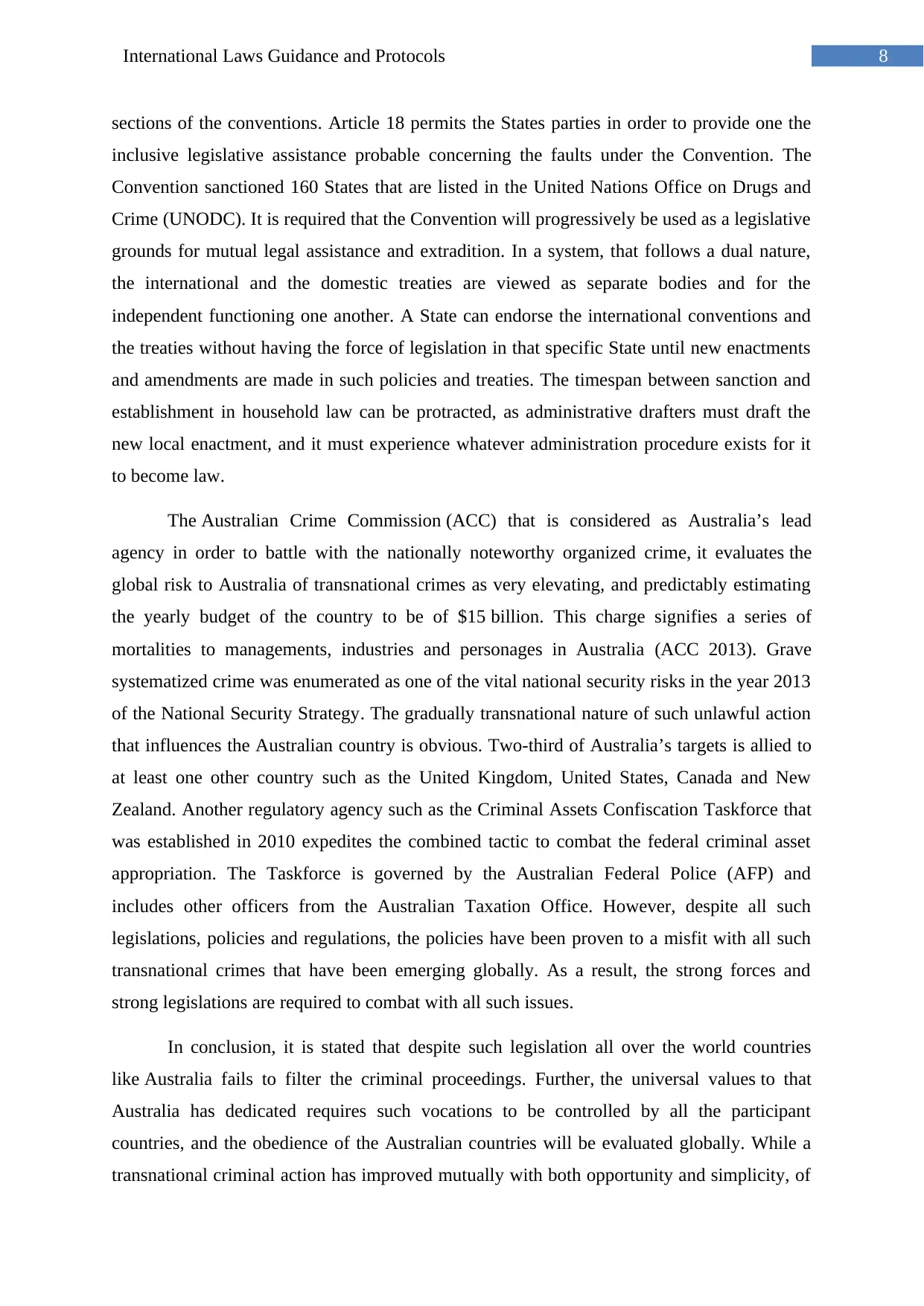
8International Laws Guidance and Protocols
sections of the conventions. Article 18 permits the States parties in order to provide one the
inclusive legislative assistance probable concerning the faults under the Convention. The
Convention sanctioned 160 States that are listed in the United Nations Office on Drugs and
Crime (UNODC). It is required that the Convention will progressively be used as a legislative
grounds for mutual legal assistance and extradition. In a system, that follows a dual nature,
the international and the domestic treaties are viewed as separate bodies and for the
independent functioning one another. A State can endorse the international conventions and
the treaties without having the force of legislation in that specific State until new enactments
and amendments are made in such policies and treaties. The timespan between sanction and
establishment in household law can be protracted, as administrative drafters must draft the
new local enactment, and it must experience whatever administration procedure exists for it
to become law.
The Australian Crime Commission (ACC) that is considered as Australia’s lead
agency in order to battle with the nationally noteworthy organized crime, it evaluates the
global risk to Australia of transnational crimes as very elevating, and predictably estimating
the yearly budget of the country to be of $15 billion. This charge signifies a series of
mortalities to managements, industries and personages in Australia (ACC 2013). Grave
systematized crime was enumerated as one of the vital national security risks in the year 2013
of the National Security Strategy. The gradually transnational nature of such unlawful action
that influences the Australian country is obvious. Two-third of Australia’s targets is allied to
at least one other country such as the United Kingdom, United States, Canada and New
Zealand. Another regulatory agency such as the Criminal Assets Confiscation Taskforce that
was established in 2010 expedites the combined tactic to combat the federal criminal asset
appropriation. The Taskforce is governed by the Australian Federal Police (AFP) and
includes other officers from the Australian Taxation Office. However, despite all such
legislations, policies and regulations, the policies have been proven to a misfit with all such
transnational crimes that have been emerging globally. As a result, the strong forces and
strong legislations are required to combat with all such issues.
In conclusion, it is stated that despite such legislation all over the world countries
like Australia fails to filter the criminal proceedings. Further, the universal values to that
Australia has dedicated requires such vocations to be controlled by all the participant
countries, and the obedience of the Australian countries will be evaluated globally. While a
transnational criminal action has improved mutually with both opportunity and simplicity, of
sections of the conventions. Article 18 permits the States parties in order to provide one the
inclusive legislative assistance probable concerning the faults under the Convention. The
Convention sanctioned 160 States that are listed in the United Nations Office on Drugs and
Crime (UNODC). It is required that the Convention will progressively be used as a legislative
grounds for mutual legal assistance and extradition. In a system, that follows a dual nature,
the international and the domestic treaties are viewed as separate bodies and for the
independent functioning one another. A State can endorse the international conventions and
the treaties without having the force of legislation in that specific State until new enactments
and amendments are made in such policies and treaties. The timespan between sanction and
establishment in household law can be protracted, as administrative drafters must draft the
new local enactment, and it must experience whatever administration procedure exists for it
to become law.
The Australian Crime Commission (ACC) that is considered as Australia’s lead
agency in order to battle with the nationally noteworthy organized crime, it evaluates the
global risk to Australia of transnational crimes as very elevating, and predictably estimating
the yearly budget of the country to be of $15 billion. This charge signifies a series of
mortalities to managements, industries and personages in Australia (ACC 2013). Grave
systematized crime was enumerated as one of the vital national security risks in the year 2013
of the National Security Strategy. The gradually transnational nature of such unlawful action
that influences the Australian country is obvious. Two-third of Australia’s targets is allied to
at least one other country such as the United Kingdom, United States, Canada and New
Zealand. Another regulatory agency such as the Criminal Assets Confiscation Taskforce that
was established in 2010 expedites the combined tactic to combat the federal criminal asset
appropriation. The Taskforce is governed by the Australian Federal Police (AFP) and
includes other officers from the Australian Taxation Office. However, despite all such
legislations, policies and regulations, the policies have been proven to a misfit with all such
transnational crimes that have been emerging globally. As a result, the strong forces and
strong legislations are required to combat with all such issues.
In conclusion, it is stated that despite such legislation all over the world countries
like Australia fails to filter the criminal proceedings. Further, the universal values to that
Australia has dedicated requires such vocations to be controlled by all the participant
countries, and the obedience of the Australian countries will be evaluated globally. While a
transnational criminal action has improved mutually with both opportunity and simplicity, of
⊘ This is a preview!⊘
Do you want full access?
Subscribe today to unlock all pages.

Trusted by 1+ million students worldwide
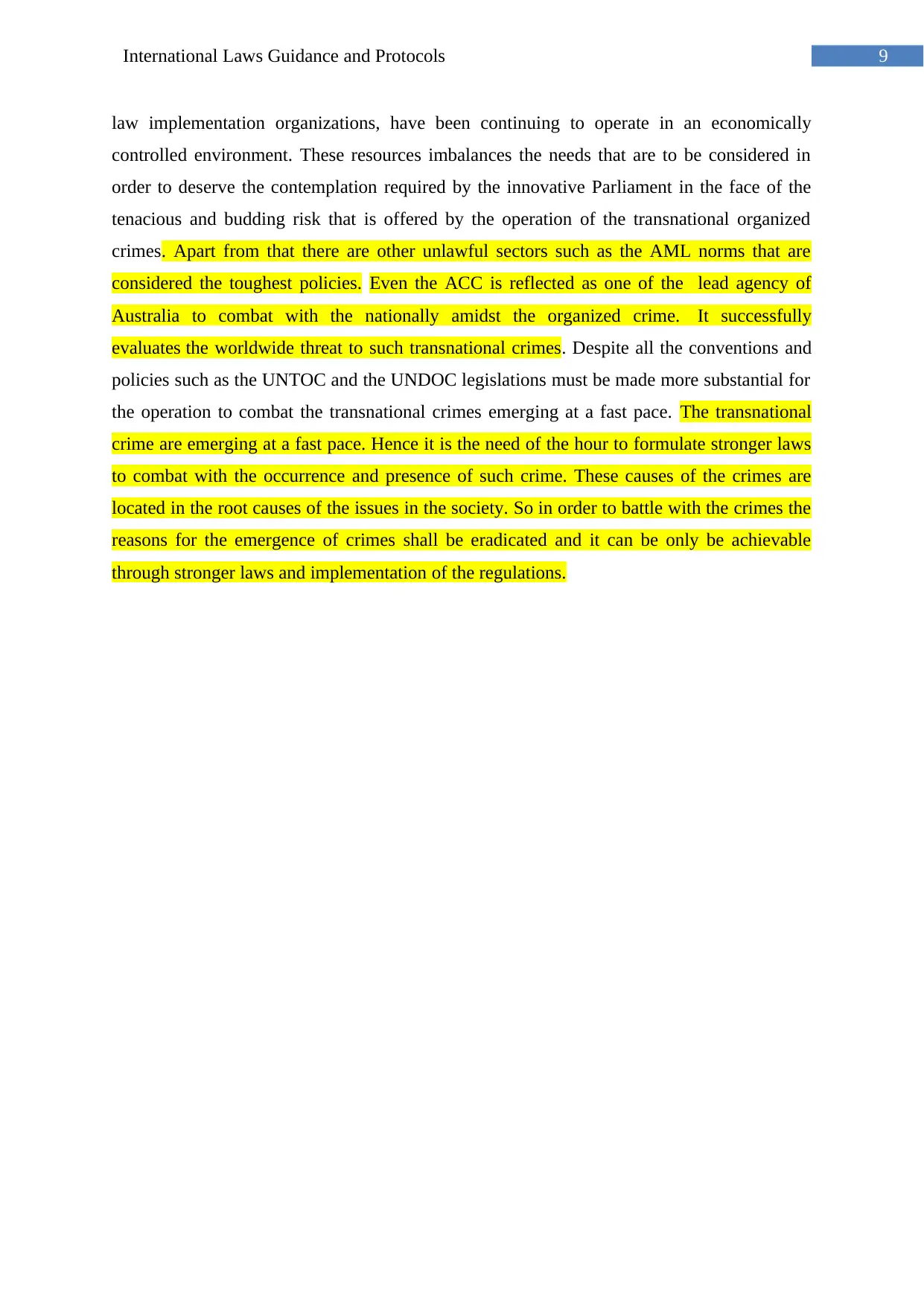
9International Laws Guidance and Protocols
law implementation organizations, have been continuing to operate in an economically
controlled environment. These resources imbalances the needs that are to be considered in
order to deserve the contemplation required by the innovative Parliament in the face of the
tenacious and budding risk that is offered by the operation of the transnational organized
crimes. Apart from that there are other unlawful sectors such as the AML norms that are
considered the toughest policies. Even the ACC is reflected as one of the lead agency of
Australia to combat with the nationally amidst the organized crime. It successfully
evaluates the worldwide threat to such transnational crimes. Despite all the conventions and
policies such as the UNTOC and the UNDOC legislations must be made more substantial for
the operation to combat the transnational crimes emerging at a fast pace. The transnational
crime are emerging at a fast pace. Hence it is the need of the hour to formulate stronger laws
to combat with the occurrence and presence of such crime. These causes of the crimes are
located in the root causes of the issues in the society. So in order to battle with the crimes the
reasons for the emergence of crimes shall be eradicated and it can be only be achievable
through stronger laws and implementation of the regulations.
law implementation organizations, have been continuing to operate in an economically
controlled environment. These resources imbalances the needs that are to be considered in
order to deserve the contemplation required by the innovative Parliament in the face of the
tenacious and budding risk that is offered by the operation of the transnational organized
crimes. Apart from that there are other unlawful sectors such as the AML norms that are
considered the toughest policies. Even the ACC is reflected as one of the lead agency of
Australia to combat with the nationally amidst the organized crime. It successfully
evaluates the worldwide threat to such transnational crimes. Despite all the conventions and
policies such as the UNTOC and the UNDOC legislations must be made more substantial for
the operation to combat the transnational crimes emerging at a fast pace. The transnational
crime are emerging at a fast pace. Hence it is the need of the hour to formulate stronger laws
to combat with the occurrence and presence of such crime. These causes of the crimes are
located in the root causes of the issues in the society. So in order to battle with the crimes the
reasons for the emergence of crimes shall be eradicated and it can be only be achievable
through stronger laws and implementation of the regulations.
Paraphrase This Document
Need a fresh take? Get an instant paraphrase of this document with our AI Paraphraser
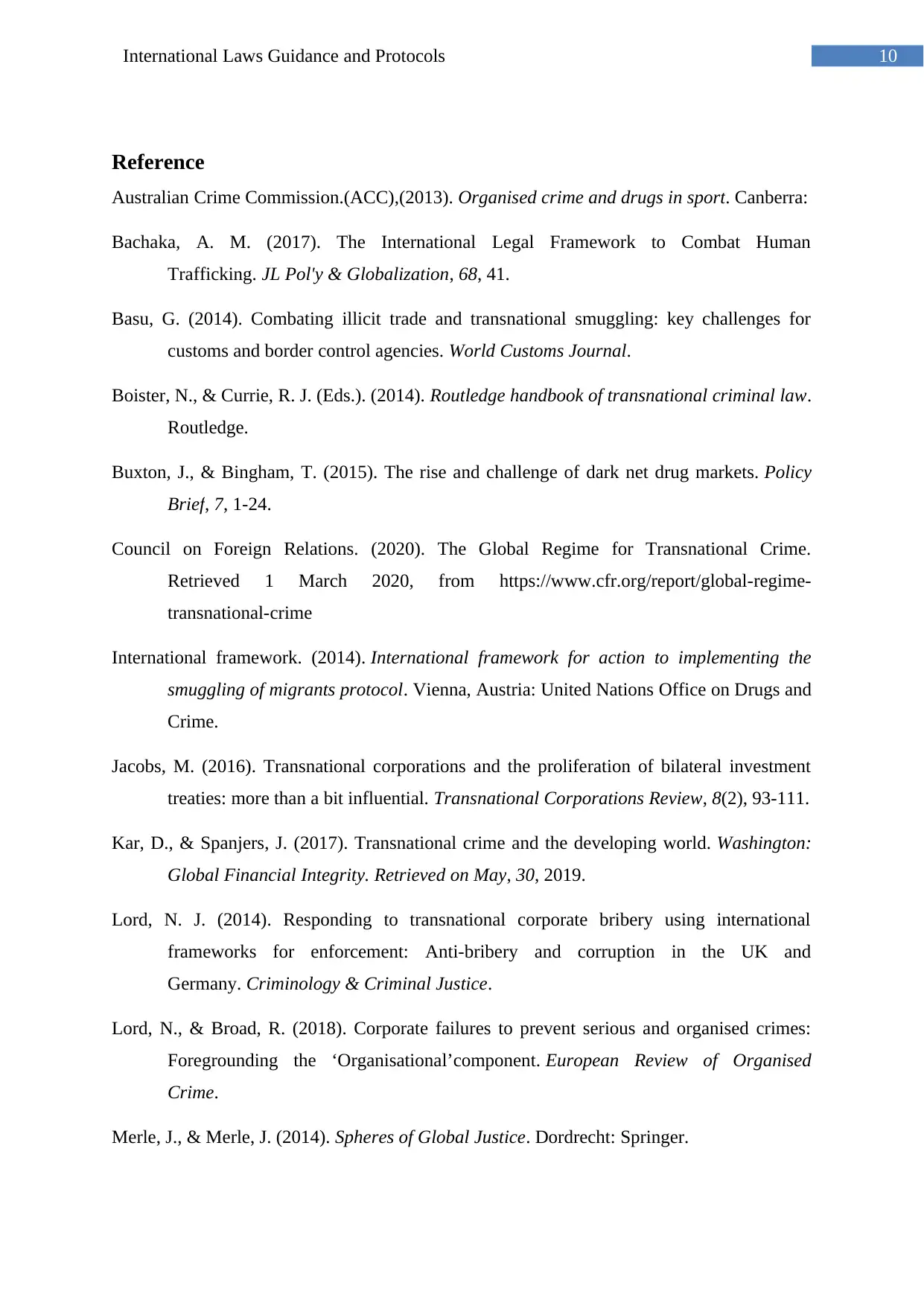
10International Laws Guidance and Protocols
Reference
Australian Crime Commission.(ACC),(2013). Organised crime and drugs in sport. Canberra:
Bachaka, A. M. (2017). The International Legal Framework to Combat Human
Trafficking. JL Pol'y & Globalization, 68, 41.
Basu, G. (2014). Combating illicit trade and transnational smuggling: key challenges for
customs and border control agencies. World Customs Journal.
Boister, N., & Currie, R. J. (Eds.). (2014). Routledge handbook of transnational criminal law.
Routledge.
Buxton, J., & Bingham, T. (2015). The rise and challenge of dark net drug markets. Policy
Brief, 7, 1-24.
Council on Foreign Relations. (2020). The Global Regime for Transnational Crime.
Retrieved 1 March 2020, from https://www.cfr.org/report/global-regime-
transnational-crime
International framework. (2014). International framework for action to implementing the
smuggling of migrants protocol. Vienna, Austria: United Nations Office on Drugs and
Crime.
Jacobs, M. (2016). Transnational corporations and the proliferation of bilateral investment
treaties: more than a bit influential. Transnational Corporations Review, 8(2), 93-111.
Kar, D., & Spanjers, J. (2017). Transnational crime and the developing world. Washington:
Global Financial Integrity. Retrieved on May, 30, 2019.
Lord, N. J. (2014). Responding to transnational corporate bribery using international
frameworks for enforcement: Anti-bribery and corruption in the UK and
Germany. Criminology & Criminal Justice.
Lord, N., & Broad, R. (2018). Corporate failures to prevent serious and organised crimes:
Foregrounding the ‘Organisational’component. European Review of Organised
Crime.
Merle, J., & Merle, J. (2014). Spheres of Global Justice. Dordrecht: Springer.
Reference
Australian Crime Commission.(ACC),(2013). Organised crime and drugs in sport. Canberra:
Bachaka, A. M. (2017). The International Legal Framework to Combat Human
Trafficking. JL Pol'y & Globalization, 68, 41.
Basu, G. (2014). Combating illicit trade and transnational smuggling: key challenges for
customs and border control agencies. World Customs Journal.
Boister, N., & Currie, R. J. (Eds.). (2014). Routledge handbook of transnational criminal law.
Routledge.
Buxton, J., & Bingham, T. (2015). The rise and challenge of dark net drug markets. Policy
Brief, 7, 1-24.
Council on Foreign Relations. (2020). The Global Regime for Transnational Crime.
Retrieved 1 March 2020, from https://www.cfr.org/report/global-regime-
transnational-crime
International framework. (2014). International framework for action to implementing the
smuggling of migrants protocol. Vienna, Austria: United Nations Office on Drugs and
Crime.
Jacobs, M. (2016). Transnational corporations and the proliferation of bilateral investment
treaties: more than a bit influential. Transnational Corporations Review, 8(2), 93-111.
Kar, D., & Spanjers, J. (2017). Transnational crime and the developing world. Washington:
Global Financial Integrity. Retrieved on May, 30, 2019.
Lord, N. J. (2014). Responding to transnational corporate bribery using international
frameworks for enforcement: Anti-bribery and corruption in the UK and
Germany. Criminology & Criminal Justice.
Lord, N., & Broad, R. (2018). Corporate failures to prevent serious and organised crimes:
Foregrounding the ‘Organisational’component. European Review of Organised
Crime.
Merle, J., & Merle, J. (2014). Spheres of Global Justice. Dordrecht: Springer.
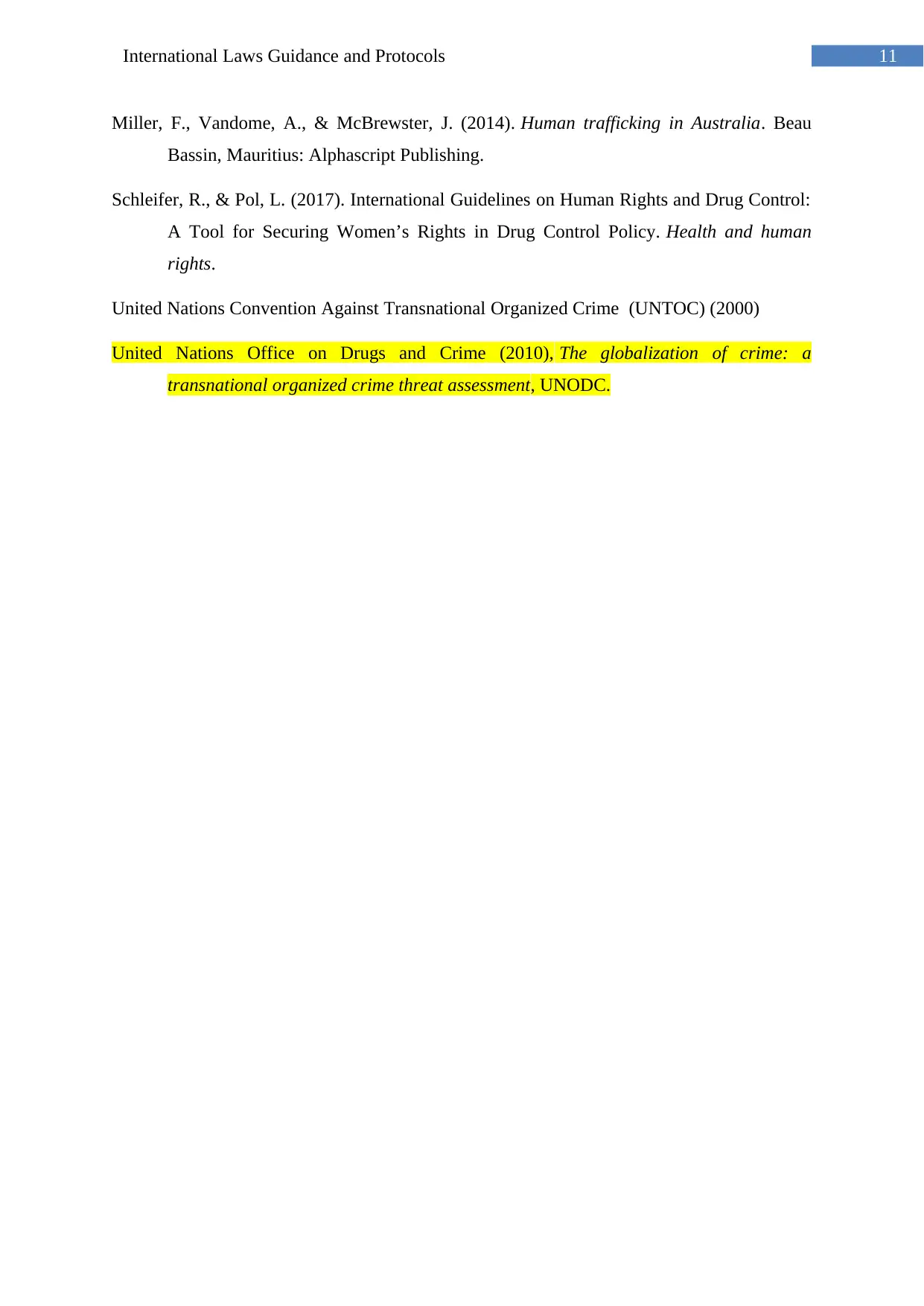
11International Laws Guidance and Protocols
Miller, F., Vandome, A., & McBrewster, J. (2014). Human trafficking in Australia. Beau
Bassin, Mauritius: Alphascript Publishing.
Schleifer, R., & Pol, L. (2017). International Guidelines on Human Rights and Drug Control:
A Tool for Securing Women’s Rights in Drug Control Policy. Health and human
rights.
United Nations Convention Against Transnational Organized Crime (UNTOC) (2000)
United Nations Office on Drugs and Crime (2010), The globalization of crime: a
transnational organized crime threat assessment, UNODC.
Miller, F., Vandome, A., & McBrewster, J. (2014). Human trafficking in Australia. Beau
Bassin, Mauritius: Alphascript Publishing.
Schleifer, R., & Pol, L. (2017). International Guidelines on Human Rights and Drug Control:
A Tool for Securing Women’s Rights in Drug Control Policy. Health and human
rights.
United Nations Convention Against Transnational Organized Crime (UNTOC) (2000)
United Nations Office on Drugs and Crime (2010), The globalization of crime: a
transnational organized crime threat assessment, UNODC.
⊘ This is a preview!⊘
Do you want full access?
Subscribe today to unlock all pages.

Trusted by 1+ million students worldwide
1 out of 12
Related Documents
Your All-in-One AI-Powered Toolkit for Academic Success.
+13062052269
info@desklib.com
Available 24*7 on WhatsApp / Email
![[object Object]](/_next/static/media/star-bottom.7253800d.svg)
Unlock your academic potential
Copyright © 2020–2025 A2Z Services. All Rights Reserved. Developed and managed by ZUCOL.




